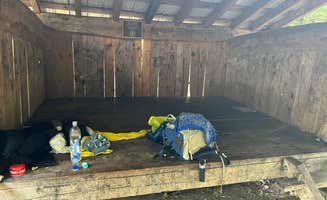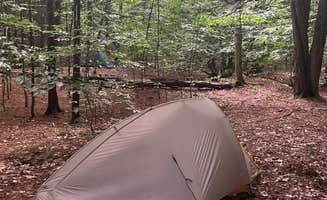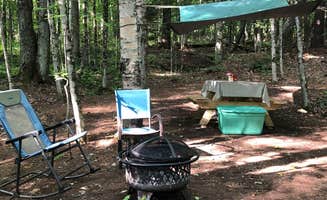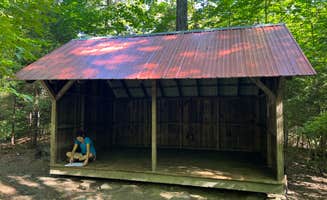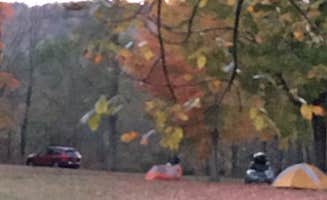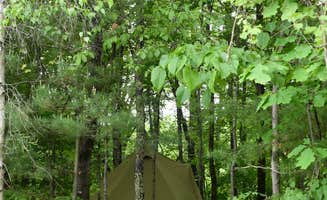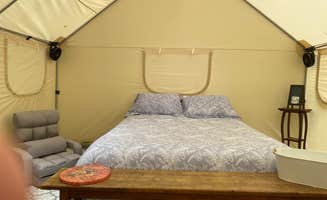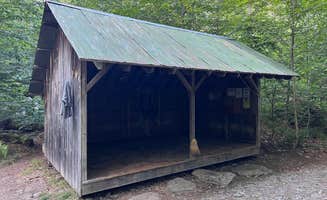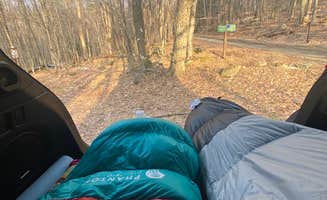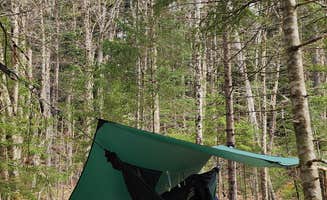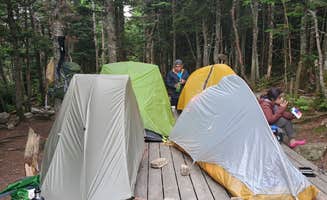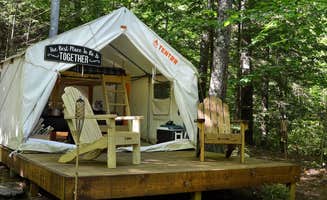Tent camping opportunities near Etna, New Hampshire extend beyond the Appalachian Trail corridor, with several alternatives for campers seeking different experiences in the White Mountains region. The area sits within the Connecticut River Valley with elevations ranging from 400 to 2,100 feet throughout nearby camping locations. Most backcountry sites experience significant temperature drops at night, even during summer months, requiring appropriate sleeping gear.
What to do
Riverside relaxation: Baker Rocks provides direct access to the Baker River where campers can fish or simply enjoy the scenery. "I tent camped here while doing some fishing in the area... Along another bend of the river were two chairs for taking in the scenery," notes Justin P. The property features a small beach area along the river perfect for wading on hot days.
Mountain climbing: Cardigan Campsites serves as an ideal basecamp for hikers tackling nearby Mount Cardigan. "Great spot to spend the night before a climb of Mt. Cardigan! Or after! The climb is challenging but shouldn't take too long. Great fire tower views at the top too!" shares Madison G. The summit climb rewards hikers with panoramic views from the fire tower.
Rock climbing: Rattlesnake Campground provides convenient access to Rumney, one of New England's premier climbing destinations. "I started climbing at Rumney about a decade before this campground was developed, and man, were we overdue for one! Maintained by the American Alpine Club, pretty much all the campers here are rock climbers," explains Les R. The proximity to climbing routes makes this a specialized option for climbers.
What campers like
Shelter variety: Winturri Backcountry Shelter accommodates different camping preferences with flexible options. "The shelter is on the larger side and could fit maybe 6-8 folks. There were lots of tent camping spots as you worked up the hill perpendicular to the shelter," reports Justin P. These varied camping spots provide options for those seeking more privacy away from the main shelter.
Unique accommodations: Baker Rocks offers alternatives beyond standard tent sites. According to April W., "The campsites are private and spacious, the property is large and beautiful, close to the river. We stayed 2 nights in the double bell tent with two clean full size beds and a 3rd night in the yurt both were spacious and wonderful, among tall trees and pines." These glamping options provide comfort for less experienced campers.
Layout design: Happy Hill Shelter features a distinctive multi-level design that campers appreciate. "The shelter had a ground floor and a loft but each floor could maybe fit 4-5 people comfortably... The loft was nice since folks could decide to sleep up there while others were down below, either cooking, arriving, or departing," explains Justin P. This arrangement creates natural separation between sleeping and activity areas.
What you should know
Water inconsistency: Seasonal water availability varies dramatically at backcountry sites, requiring preparation. At Happy Hill Shelter, "There wasn't any water at the source while I was staying here and it looks like a seasonal source," reports Justin P. Hikers should plan to carry additional water during dry periods, particularly August and September.
Tent site limitations: Finding level ground for tents requires early arrival at some shelters. Justin P. observed at Thistle Hill Shelter that "I got to the shelter late in the day so my view on the tent camping might be biased, but it seemed to have smaller spots for tent camping that were somewhat sloped." Terrain challenges increase after rain when flat areas may become muddy.
Amenity differences: Facilities vary significantly between established campgrounds and backcountry sites. At Baker Rocks, "The facilities here were great. There is a full bathhouse with individual rooms for showers and sink/toilets, with running water," notes Justin P. Meanwhile, backcountry sites typically offer only a basic privy and seasonal water sources.
Tips for camping with families
Wildlife encounters: Some campgrounds offer unique animal interactions. April W. describes Baker Rocks: "They even have animals to visit like bunnies and goats (far away from the campsites). Do bring bug spray, the mosquitoes at certain times of day were aggressive, as to be expected." Morning and evening are typically when insects are most active.
Weather preparation: The area experiences significant weather variability, even in summer. "Our family of 4 visited Baker Rocks during a very rainy week and still had an amazing time," shares April W. Waterproof shelter and appropriate clothing layers remain essential throughout the camping season.
Staff support: Some campgrounds provide helpful hosts who enhance the family camping experience. Justin P. notes at Baker Rocks, "Check-in was super easy with the camp hosts who were very flexible with timing and wanted to make sure I had a great stay. The property and individual sites are deliberately designed with guests in mind." This assistance helps families navigate their camping experience more easily.


